Location
Our Seattle Location
Northpoint Seattle’s outpatient treatment program is located in beautiful Seattle, Washington, and we work to help the surrounding communities.
- Seattle
2111 N Northgate Way Suite 101,
Seattle, WA 98133, United States
Whether you're struggling with a heroin abuse problem, can't seem to put the bottle down, or are compelled to gamble your savings away day after day, the fact remains that you are addicted.
But what is addiction really? What causes it in the first place? What's the difference between abusing a drug and becoming addicted to it? Can you get hooked on a behavior just like you can become dependent on a drug?
And most importantly of all, how can you overcome your addiction?
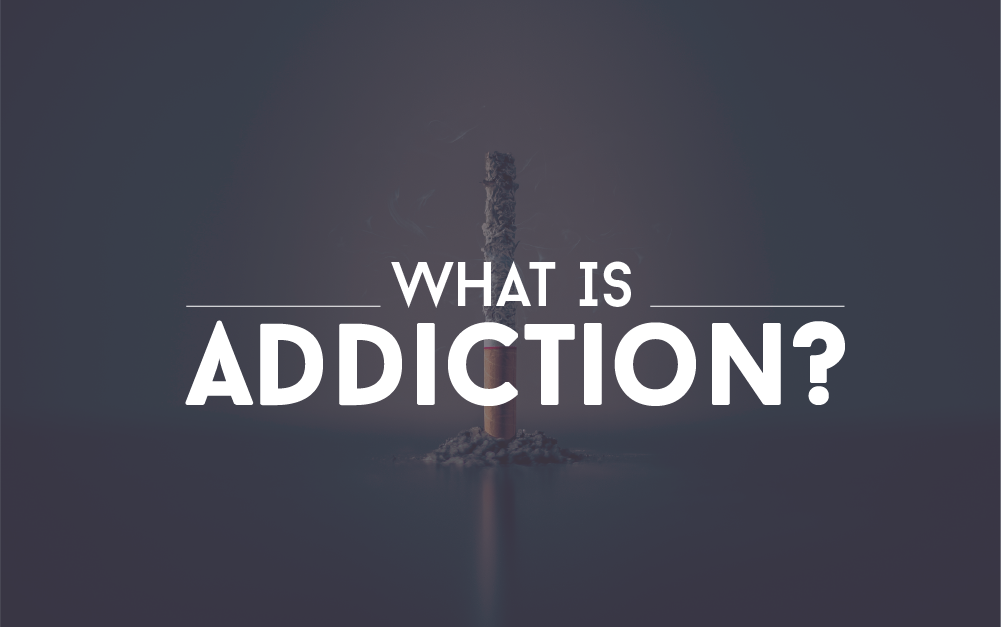
Two of the best definitions of addiction come from the National Institute on Drug Abuse (NIDA) and the American Society of Addiction Medicine (ASAM).
a chronic, relapsing brain disease that is characterized by compulsive drug seeking and use, despite harmful consequences. It is considered a brain disease because drugs change the brain—they change its structure and how it works. These brain changes can be long-lasting and can lead to the harmful behaviors seen in people who abuse drugs.
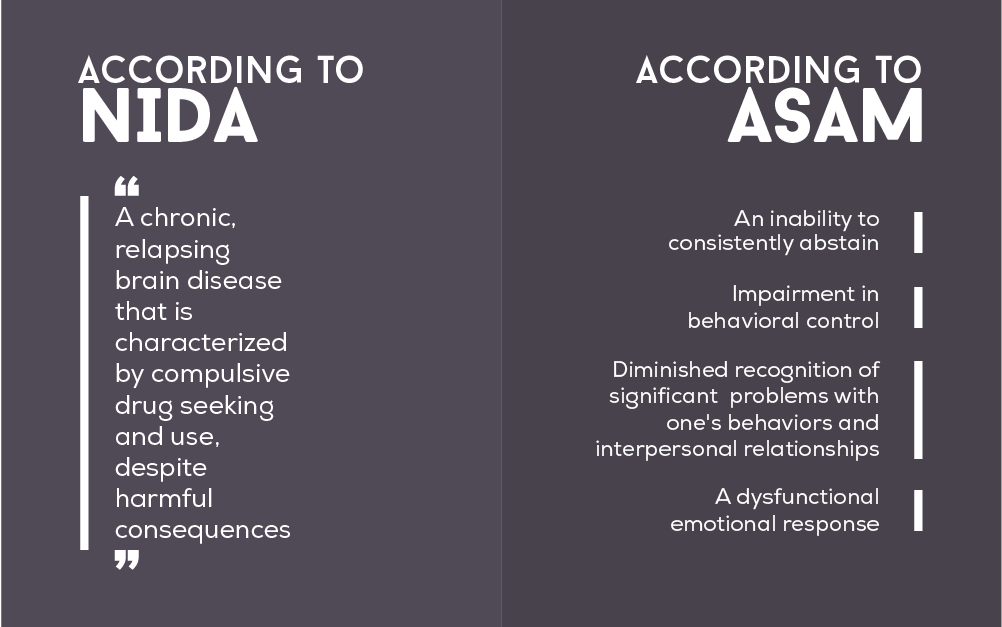
ASAM defines addiction as:
an inability to consistently abstain, impairment in behavioral control, craving, diminished recognition of significant problems with one's behaviors and interpersonal relationships, and a dysfunctional emotional response. Like other chronic diseases, addiction often involves cycles of relapse and remission. Without treatment or engagement in recovery activities, addiction is progressive and can result in disability or premature death.
Beyond that quality, though, you may notice that each of these definitions has three overlapping components used to describe addiction: a loss of control, continued abuse despite negative consequences, and a relapsing nature.
Most experts agree that these qualities are the core components of addiction. And in general, most addicts will experience each of these qualities at one point or another.
Let's take a closer look at the three fundamental qualities of addiction to help you better understand what this disease is all about.
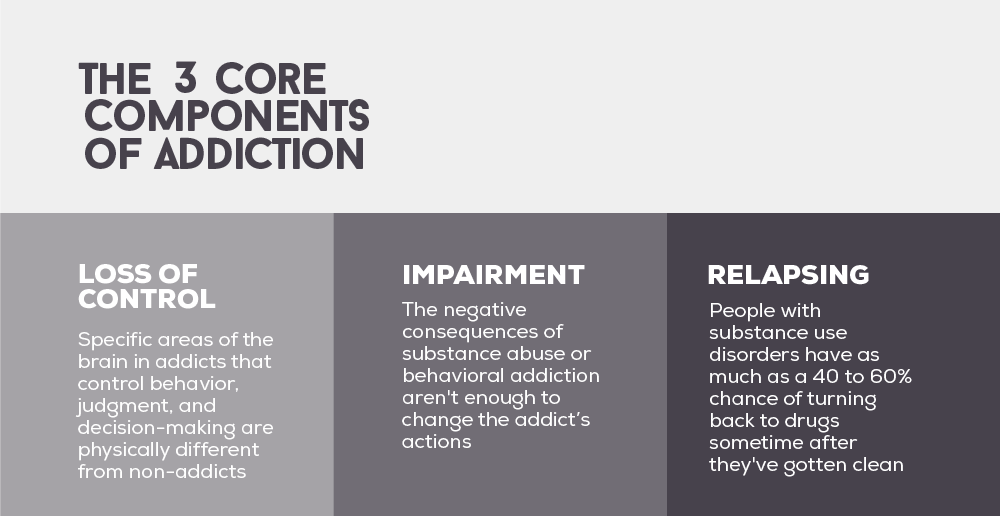
When you're addicted, using a substance or engaging in a specific behaves so ingrained that eventually, you tend to lose control of your actions. No matter how resolutely you determine to cut down on your drinking; no matter how many pep talks you give yourself about never gambling again; no matter how determined you may feel about stopping your drug habit in its tracks- if you're an addict, you'll likely fall back into old bad habits regardless of how serious may be about getting clean.
That's because when you're addicted, the changes in your brain make it nearly impossible to exert the same self-control you had before. And that makes your addictive actions compulsive. This is one of the most notable signs of addiction, and unfortunately, most people don't understand just how uncontrollable an addict's abusive behaviors really are.
In fact, NIDA points out that brain imaging studies have shown that specific areas of the brain in addicts that control behavior control, judgment, and decision-making are physically different from non-addicts. And scientists believe that these changes "may help explain the compulsive and destructive behaviors of an addicted person."
For most people, recognizing that a behavior comes with serious negative consequencesh to know not to engage in that behavior again. The embarrassment of getting caught in a lie to friends and family members can help keep people honest. Getting into a fender bender can teach you not to text and drive.
And when it comes to addiction, there are a plethora of negative consequences that would be enough to turn most people away from using again. Serious health problems like organ damage, cardiac complications, and breathing irregularities are all common with many drugs. Run-ins with the law can come from unchecked behavioral addictions. And when you're an addict, your social and family life is bound to suffer too.
But when you're addicted, all of these negative consequences of your substance abuse or behavioral addiction aren't enough to change your actions. And continuing to engage in drug use or certain behaviors despite your life falling apart around you because of it is a clear sign of a serious problem.
The final characteristic of an addiction is the fact that it is chronic, and most addiend up relapsing at some point in their lives. In fact, studies have shown that people with substance use disorders have as much as a 40 to 60% chance of turning back to drugs sometime after they've gotten clean.
And while this statistic may seem a bit disheartening for some, the truth is that these numbers aren't much different from other chronic diseases. According to NIDA, type 1 diabetes has a relapse rate of around 30 to 50%. Hypertension comes in at around 50 to 70%. And people living with asthma go through relapse around 50 to 70% of the time.
As with these other chronic diseases, there is no cure for addiction- at least not yet. Instead, an emphasis needs to be placed on continual management. Beyond that, just because an addict has relapsed doesn't mean that treatment has failed. It just means that the approach needs to be adjusted and reinstated.
Addiction has a long history of being misunderstood, and today, many people end up blaming the victim. Too often people mistakenly believe drug abuse is simply caused by a moral failing and a poor choice. They believe that quitting drugs is as easy as just snapping your fingers and choosing to be done.
To make matters even worse, some neuroscientists and organizations believe the same thing and spread the idea that addiction is somehow a kind of choice. To them, it's just a behavioral problem.
In actuality, alcoholism was classified as a disease by the American Medical Association in 1956. Drug addiction followed suit two decades later. In the same way it is wrong to blame someone for having the flu, it is equally wrong to blame someone for being alcoholic or addicted to drugs.
This view of addiction is called the disease model, and an overwhelming majority of the addiction community follow it. This model characterizes true addictive behaviors as being compulsive and outside the victim's control. Added to that, the disease involves observable physical changes in the brain as well. Drugs alter the brain in fundamental ways that make quitting almost a physiological impossibility, even for those who want to.
As a result, while it may seem like an individual should be able to stop using if they put their mind to it, the hard reality is that often they cannot.
Don't be confused- the initial decision to take drugs is usually voluntary. Lots of people are curious and choose to "experiment" with drugs at some point in their life. But that initial experiment starts changing brain chemistry immediately. Repeated drug use can cause chemical changes in the brain that make it difficult to resist intense urges to take drugs.
And while willpower may not be responsible for staying addicted, it can be quite useful in certain stages of recovery.
Studies have shown that the brain of an addict is physically different than one of a non-addict. According to the National Institutes on Drug Abuse (NIDA):

Brain imaging studies of people with addiction show physical changes in areas of the brain that are critical to judgment, decision making, learning and memory, and behavior control. Scientists believe that these changes alter the way the brain works and may help explain the compulsive and destructive behaviors of addiction.
Most drugs affect the brain's "reward circuit" by flooding it with dopamine. This reward system is responsible for making you feel good for things you do in your regular life. Things like eating great food, engaging in a hobby, and spending a fun time with friends and family may hit that reward circuit. Things like exercising or finishing a difficult but rewarding project may also give you a good dopamine high.
But if watching a great movie or spending time with loved ones gives you a controlled drip of dopamine, using drugs gives you an overflow. In fact, NIDA states that some drugs can release as much as ten times the amount of dopamine triggered naturally.
And this overstimulation of the reward circuit causes the intensely pleasurable "high" that can lead people to take a drug again and again.
Doesn't sound too bad, right? Indeed, the idea that a simple substance could chemically give you that sort of high is part of why people try it and get addicted in the first place. But it all goes downhill from the first "experiment."
If a person continues their drug use, the brain starts to adapt to this excess dopamine. And soon, it starts making less of it and reducing your body's ability to respond to it. Just like with anything else, your body knows when it has too much of something, and immediately starts trying to balance it out.
Sometimes it increases the potency of certain chemicals in the brain to counteract the potency of the drug as with alcohol and benzodiazepines. Other times it deactivates specialized receptors that enable the euphoric high to take place like with opioids. And sometimes it can make adrenaline less effective as with certain behavioral addictions.
It all depends on what it is you're addicted to in the first place.
No matter what kinds of specific changes take place, it's all in an attempt to make the drugs or behaviors that you're addicted to have less of an intense effect. And that ends up leading to a buildup of tolerance.
And that means you need more of the drug to achieve the same high.
This generally leads to a few different things happening.
The first is an increase in the use of the drug or behavior, as you become more and more desperate to achieve the same high as before. You see, dopamine doesn't just create pleasure- it's also one of the main chemicals used by the brain when learning. And the brain quickly links liking something to wanting it.
You don't just want the pleasure of the high from before- you're pushed to crave it on a psychological level.
Another effect of these changes is a drop in the pleasure you get from things you used to enjoy. You often become uninterested in social activities, food, and hobbies. These things no longer stimulate your "reward circuits," because the dopamine overload you've gotten from drug use has made you numb to them. This is why a loss of interest in hobbies is one of the most common signs of a serious addiction problem.
And finally, as your addiction becomes even more intense, the physical changes in your brain become even more pronounced. And when you do try to quit, these enormous changes can bring on some pretty uncomfortable physical and psychological symptoms known as withdrawals.
We'll get more into withdrawals later but in most cases, the more severe the addiction is, the more severe withdrawals will be. And for some, they can end up being so uncomfortable that they'll often turn back to using just to get some sort of relief.
As you can see, the changes in your brain brought on by addiction make it harder for you to go back to a life of sobriety.
It may surprise you to learn that there is a nearly infinite number of possible addictions. As addiction researcher Mark Griffiths warns, "if the rewards are there people can become addicted to almost anything."
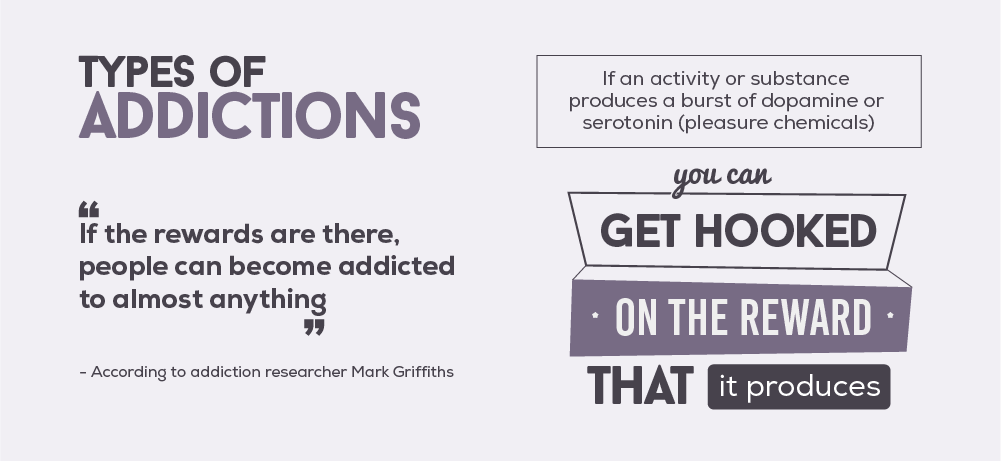
If an activity or substance produces a burst of dopamine or serotonin (another pleasure chemical), then you can get hooked on the reward that it produces. That being said, there are a few different things that can produce more intense rewards than others.
When most people talk about addiction, they're usually talking about a dependency on drugs.
Heroin, cocaine, methamphetamine, and even prescription drugs like OxyContin and Xanax are all highly addictive. And that's because these substances all tend to produce especially strong reactions in the brain's reward centers.
In fact, drug addiction has become such an enormous problem today that drug overdoses have become the #1 cause of deathamong Americans under the age of 50.
It's even gotten so bad that life expectancy, in general, has dropped dramatically as a result of the ever-rising rate of drug addiction in this country.
This is due in large part to the raging opioid epidemic which is killing more than 91 Americans every single day.
However, it's also worth noting that most illicit drug addiction rates- including cocaine and meth- are also on the rise. Even if they aren't getting the same kind of attention as opioids.
Another point worth remembering about drug addiction is that the overwhelming majority of addicts don't end up getting the professional treatment they need to overcome their addiction. According to a national survey conducted by the Substance Abuse and Mental Health Services Administration (SAMHSA), less than 1 in 5 illicit drug addicts received treatment in 2016.
That means a whopping 6 million Americans didn't get the help they needed to kick their addiction!
Drug addiction, then, is an incredibly serious problem today.
Of course it is!
All too often, alcohol tends to get special treatment when it comes to addiction. People tend to excuse obviously addictive behaviors simply because this substance of abuse is legal. In fact, many different environments and cultures even encourage behaviors that come dangerously near to alcoholism.
But even though binge drinking to excess and having numerous cocktails in one sitting might be acceptable in some circles, the truth is that if your alcohol consumption results in the addiction criteria above, then you've got a serious problem.
And if it does, you aren't alone. Alcoholism is incredibly common in the United States today. According to the National Institute on Alcohol Abuse and Alcoholism (NIAAA), around 6.2% of Americans over the age of 18 have an alcohol addiction.
That means that more than 1 out of 20 adults in this country is an alcoholic. And because alcohol abuse kills around 88,000 people a year (making it the third leading preventable cause of death), this type of addiction is especially dangerous.
The main takeaway here is that even though alcohol is technically legal, it doesn't mean that it's any less habit-forming than other substances that cause addiction.
Addiction isn't just about drugs and alcohol though. In fact, it's possible to become addicted to certain behaviors as well. Gambling, sex, shopping, video games, social media, and more have all been shown to cause releases of dopamine in the same reward circuit in the brain as certain drugs.
And when you engage in these behaviors too often or too intensely, it can cause the same kind of dependency issues as substances of abuse. Eventually, the reward center comes to associate pleasure only with that behavior and causes the person to start craving it. And soon, that behavior becomes uncontrollable and compulsive.
While the physical effects of these kinds of addictions may not be quite as drastic as with most addictive substances, the psychological effects can be disastrous. Anxiety, depression, and mood instability can all be brought on by behavioral addictions.
But more than that, a behavioral addiction can be just as all-consuming. A behavior addict may empty their savings, find it impossible to hold down a job, remove themselves from socialization, and alienate people they care about just the same way a substance abuser might.
Even though a behavioral addiction may not seem as dangerous as, say, an addiction to opioids, the truth is that this type of dependency can end up ruining your life just the same. And that means you need professional help.
We've spent a fair amount of time looking at what addiction is. And now it's time to look at what it isn't.
There are a lot of misconceptions out there about addiction. Maybe some people see another person's behaviors and wrongfully jump to the conclusion that they're addicted. Or maybe they're wondering if just because they've become physically dependent on their medication does that mean that they're addicted?
That's why it's also important to know what does not qualify as addiction.
The short answer here is no- physical dependence and addiction aren't the same.
While addiction most commonly comes with physical dependence, the two can be and often are quite separate.
For instance, it is possible to be addicted to a hallucinogen like LSD even though many agree that you can't be physically dependent on it. Added to that, you can become physically dependent on back pain pills, but that doesn't necessarily mean you're addicted.
That's because addiction, as we've seen, is more about compulsive behaviors despite negative consequences. Physical dependence, on the other hand, is usually characterized by two things: tolerance and withdrawals.
Similar to dependence, abuse and addiction aren't the same either, even though they're often used interchangeably.
To put it simply, abuse is using a substance either illegally or to achieve an effect that the substance wasn't designed for. One of the main differentiators here is that abuse can happen in a single event. Addiction is more habitual.
Let's look at some ways certain substances can be abused.
For illicit substances like heroin, cocaine, and crystal meth, using the drug even once is considered to be abuse. That's because there is no legally or medically acceptable reason to use these drugs- ever.
For prescription drugs, it's taking the medication in a way it isn't prescribed- and that can mean a lot of different things. For instance, it's considered abuse if you:
And as you can see, you can in fact accidentally abuse a prescription medication quite easily too.
For alcohol, abuse may be a little bit harder to identify. Some consider it to be drinking more than the maximum amount recommended by the federal 2015-2020 Dietary Guidelines for Americans (about 2 drinks per night for men and 1 for women).
However, others claim that anytime your drinking starts causing any kinds of problems (with the law, your job, family members, etc.) then it becomes alcohol abuse.
Some people who try drugs become extremely addicted almost immediately. But not everybody who tries drugs becomes addicted so easily. The path is different for everyone.
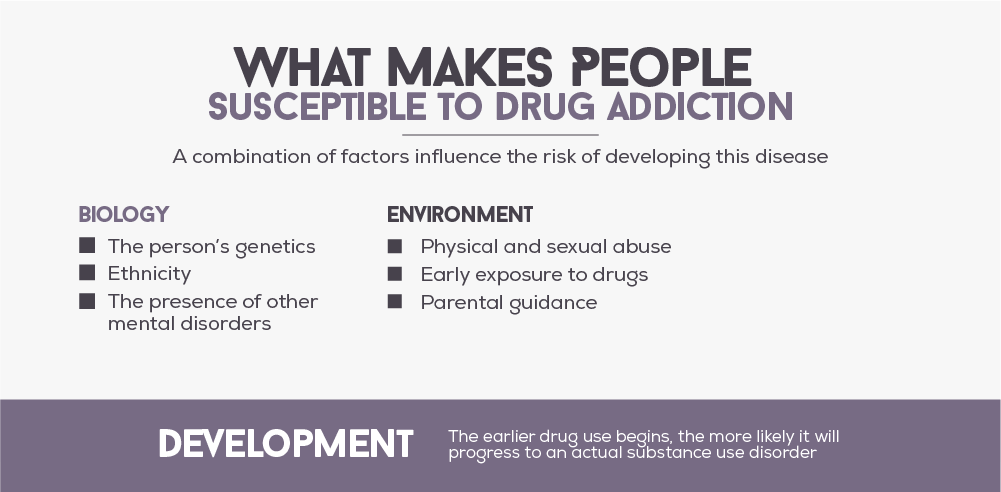
A combination of factors influence the risk of developing this disease, and no definitive factor or symptom confirms it. More than most diseases, addiction must be considered on a case-by-case basis.
Another factor in determining the risk of developing an addiction is the presence of pre-existing mental disorders like depression, anxiety, bipolar disorder, or borderline personality disorder.
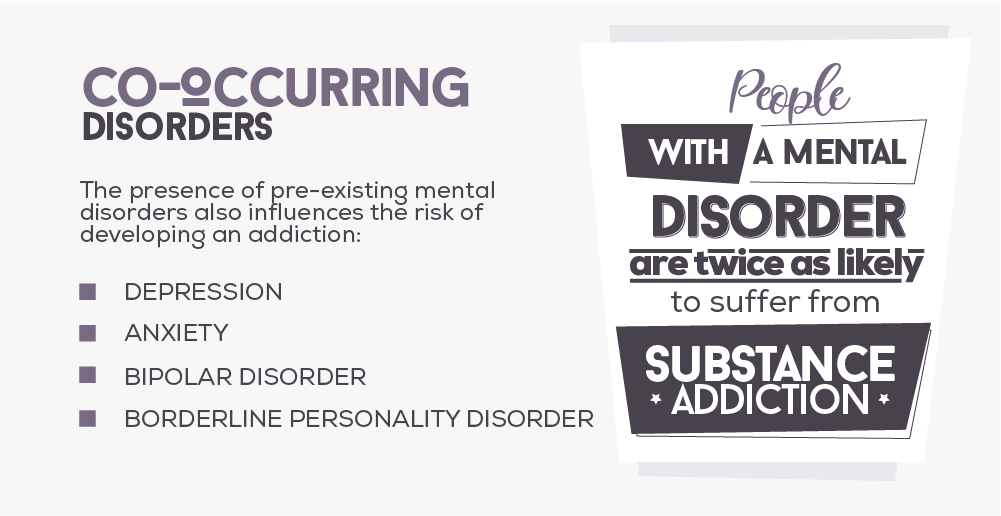
Researchers have found that people with a mental disorder are twice as likely as the general population to suffer from substance addiction. Plus, people with a substance use disorder are also twice as likely to have a mental disorder too.
Having a mental disorder and a substance abuse disorder at the same time is referred to as a co-occurring disorder.
Added to that, segments of the population that are more likely to experience these types of disorders are also more likely to develop a substance abuse problem. Military veterans, for instance, are much more prone to suffer from PTSD. And researchers have found that around one-third of veterans seeking help for substance abuse also met the criteria for having PTSD.
The fact that mental disorders and addiction often go hand in hand is critical when it comes to treatment. That's because, to ensure the best chances for future sobriety, both disorders must be effectively treated, not just one.
For instance, if someone with a drug problem gets out of rehab but still suffers from depression, they're going to be more likely to turn back to substance abuse to try and cope with their depression.
In that same vein, if that same patient's depression is finally under control while they still have an addiction, their substance abuse can start impacting their life negatively which can end up causing their depression to develop again.
Unless both are handled properly by a program that's qualified to do so, the cycle will just keep on continuing.
Unfortunately, it's a little optimistic to call the fix for addiction a "cure." It's worth remembering that this disease is a chronic condition that, once experienced for the first time, can come back even after years of sobriety. Those changes to the brain chemistry are often permanent, and because of that, it's never really "cured."
However, addiction is treatable- with the right kind of help. And in most cases, you'll need to undergo professional treatment to ensure the very best chances of overcoming your dependency problem.
The best treatment programs will consist of three vital stages: detoxification, rehabilitation, and aftercare.
Detoxification is often the very first part of your addiction recovery process (besides finally admitting you have a problem that is). This is when you quit using the substance of abuse or engaging in the behavior that you've been addicted to. Once you do, your body will start re-adjusting to functioning normally without it.
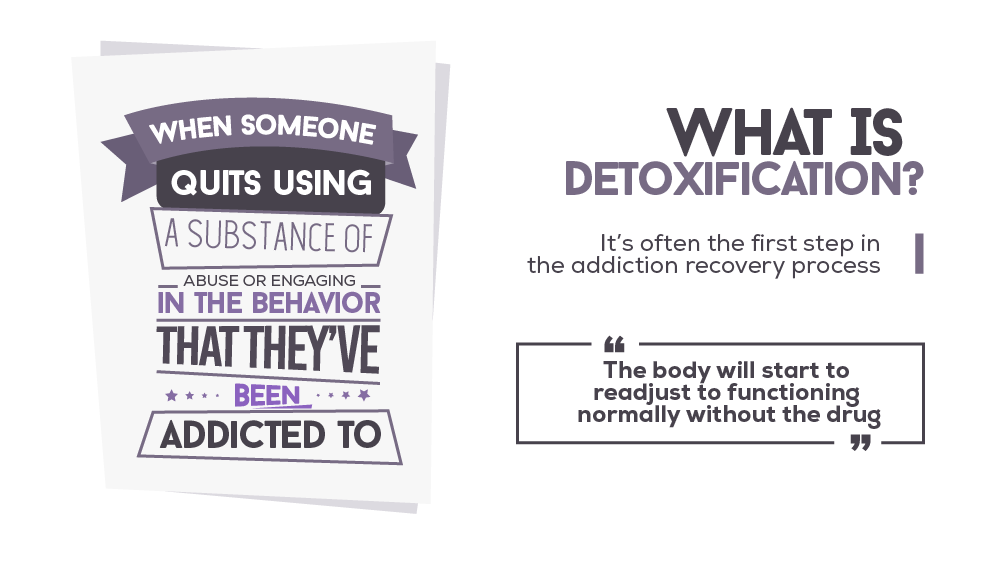
However, as we discussed earlier, this stage is often accompanied by a host of uncomfortable symptoms known as withdrawals. These can be physical, bombarding your body with aches and pains for days, and they can also be psychologically tortuous as well.
While every unique substance has their own unique set of withdrawal symptoms, some of the most common you can expect to endure include:
Besides alcohol and benzodiazepines, these symptoms aren't often directly life-threatening. However, they can end up leading to many complications that, when combined with other conditions, can end up being fatal.
Added to that, many substances also have their own specific withdrawal timelines as well. And some of these can end up being weeks at a time.
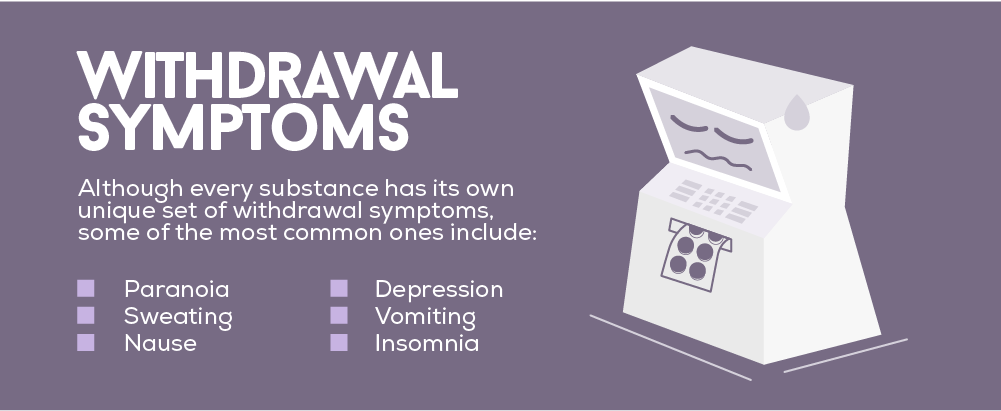
Beyond that, they'll also have the medical expertise to prevent and treat any life-threatening complications that may arise along the way.
Plus, they'll be able to protect you from your own worst enemy- yourself. Many recovering addicts, unfortunately, think that they can simply push through withdrawals on their own without expert guidance. But often these withdrawals can be so overpowering that it becomes nearly impossible to stop yourself from turning back to using.
With a professional detox program for drugs or alcohol, you can rest assured that you won't resort to using again- no matter how bad things get.
In a word- very.
Rehabilitation is the second stage of the recovery process, and it's necessary if you hope to achieve sobriety. Unfortunately, it doesn't always get the same credit as detoxification.
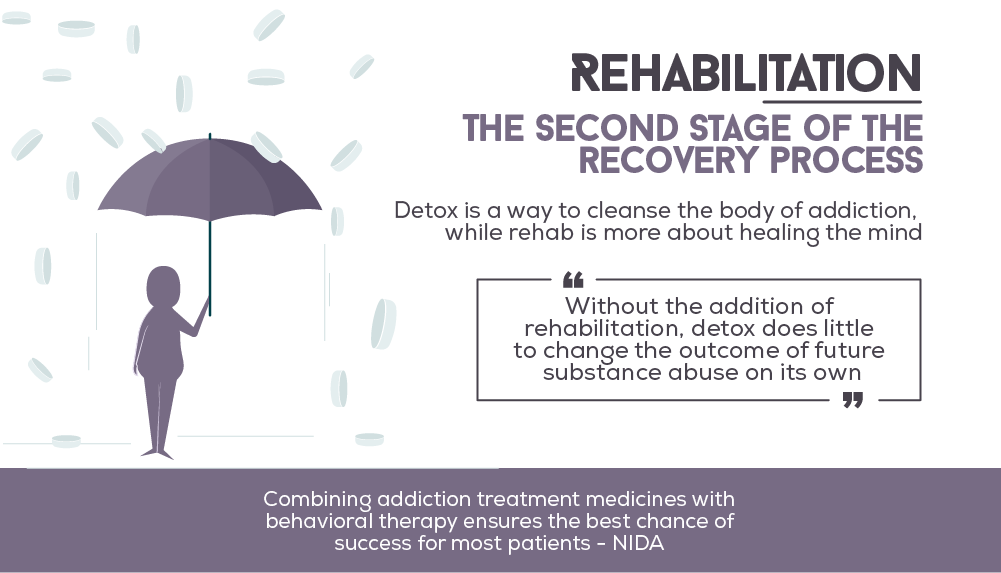
In fact, some people believe that once they've gone through detox, they're essentially cured of their addiction because their body has readjusted to functioning without the help of drugs.
This, of course, couldn't be further from the truth. As many health organizations have pointed out, without the addition of rehabilitation, detox does little to change the outcome of future substance abuse on its own.
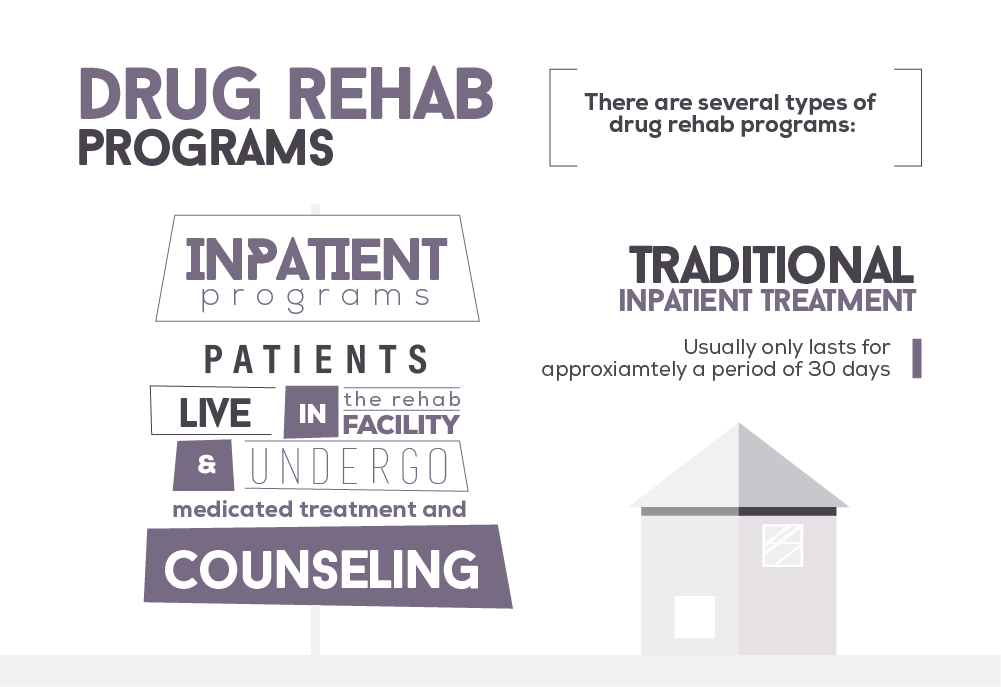
And that's exactly what rehabilitation does. If you think of detox as being a way to clear the body of your addiction, rehab is more about healing the mind. And as we've seen, addiction can cause an enormous number of changes in the brain that can make this process quite difficult.
In general, there are three different types of therapies that an alcohol or drug rehab program will use to reverse these changes in the brain or help you cope with them more effectively: individual counseling, group talk, and behavioral therapies.
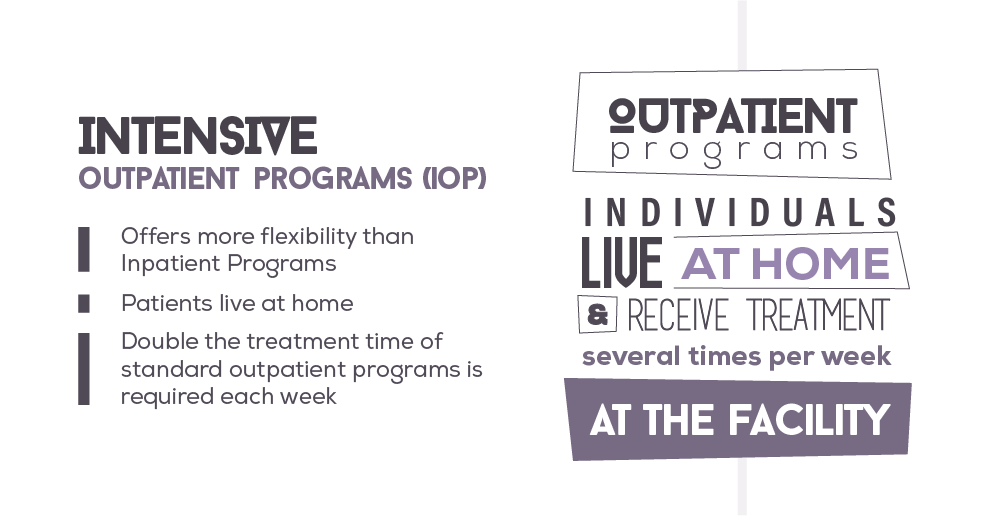
And while there are three main types of rehabs you can choose from (inpatient, outpatient, and intensive outpatient programs or IOPs) you'll likely be exposed to each over the course of your recovery.
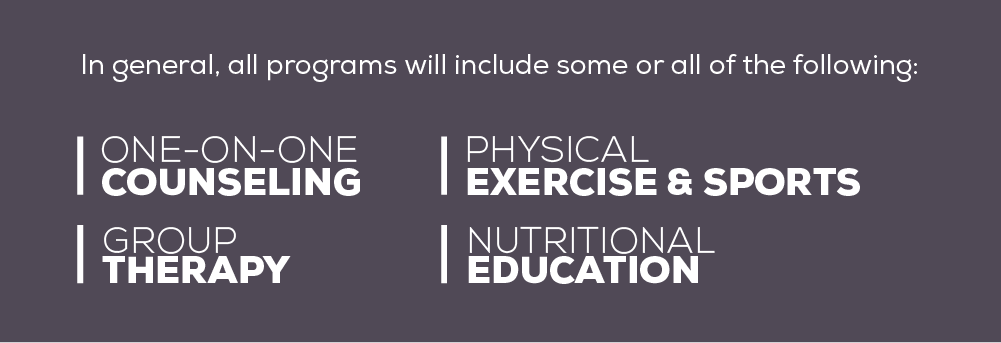
Below is a breakdown of what these treatments can offer.
As we saw earlier, many times addiction develops alongside other mental probl as co-occurring disorders. Whether it's a past trauma you haven't dealt with, or it's a mental disorder like anxiety, depression, or schizophrenia, these disorders can end up making your substance abuse even worse.
When you work with an individual counselor, you'll get to the heart of your addiction and any unaddressed problems that it may have stemmed from. That way, you'll be treating the cause of your substance abuse rather than just the symptoms.
Group talk is an essential part of any rehabilitation program. These sessions play ble role of fostering social bonding, eliciting emotional and motivational support, and helping addicts gain a bit of perspective on their disorder.
Added to that, many group talk therapies will give patients the opportunity to learn from other individuals' mistakes and hopefully prevent them from happening during their recovery.
While counseling and group talk are a great way of thinking about what cau addiction and getting the support you need to stay sober, behavioral therapies give you the strategies and tools you need to fend off cravings.
Mindfulness meditation, Cognitive-Behavioral Therapy, and numerous other treatment programs will show you how to maintain self-control and prevent relapse in the most tempting of times. Plus, you'll also learn how to identify triggers, avoid certain problematic situations, and recognize the long-term impacts of actions in the heat of the moment.
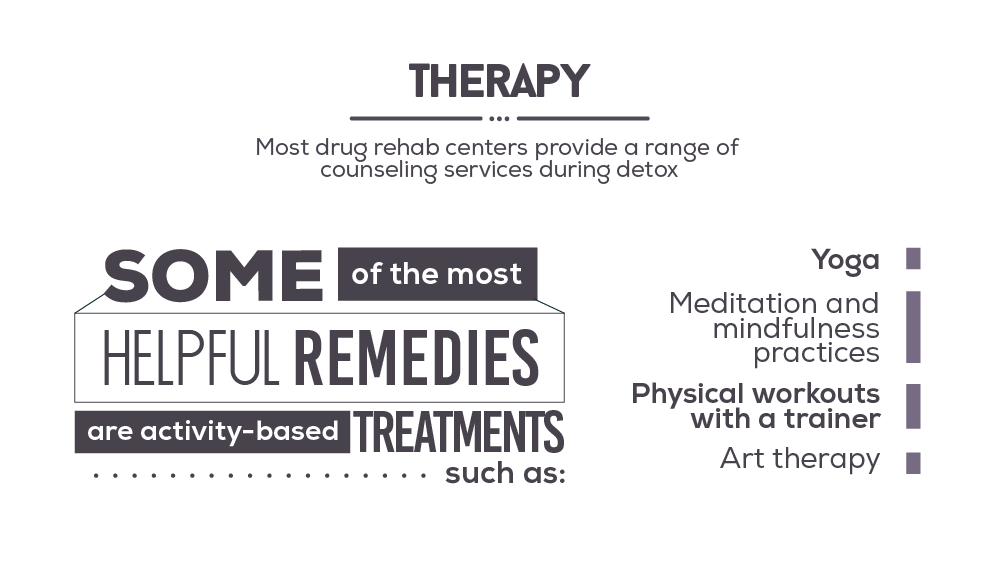
Once you've made it through both detoxification and rehabilitation, the battle with addiction still isn't over. In fact, some recovering addicts claim that it's only just begun.
That's because while going through detox and rehab can be tough, it forces you to think about your addiction almost constantly. But once you finish a program entirely, maintaining your sobriety once your life has gotten back to normal can end up being harder than you anticipate.
That's why enrolling in an aftercare program is so essential for staying clean in the long-term. These programs can consist of group meetings, short educational sessions, individual meetings, and many other kinds of activities. It depends on what kind of program you choose to enroll in.
In most cases, you can contact your rehab program for more information on what kinds of programs are in the area and, most importantly, which are proven to help.
But no matter which program you do choose, the main goal is still the same: to keep you focused and reduce the likelihood of relapsing.
Below are some of the most common aftercare programs that recovering addicts have found help them stay clean after leaving rehab.

Addiction can be overwhelming. It can lead to physical complications that may put your life in danger. It can jeopardize your credit, your career, and even your legal record. And finally, it can alienate you from friends, family members, and the people in your life that you value most.
Addiction, then, can ruin your life.
And to overcome it, you need professional help. That's where Northpoint Seattle comes in. We understand and sympathize with how difficult it can be to face an addiction. And our treatment reflects that compassion.
But what makes Northpoint Seattle stand out among the rest?
But most importantly of all, we are passionate about helping recovering addicts achieve sobriety and maintain it for the rest of their lives.
You don't have to be a slave to your addiction and recovery is possible. We can help.
So, call us today for a free phone assessment to get started.
Or, if you have any questions about addiction, the recovery process, or about the Northpoint Seattle and how we can help you attain sobriety, don't hesitate to contact us.

Our admissions coordinators are here to help you get started with treatment the right way. They'll verify your health insurance, help set up travel arrangements, and make sure your transition into treatment is smooth and hassle-free.
888.483.6031Contact Us